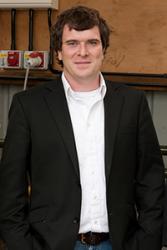Unused energy sources could contribute to farm sustainability
 Parts of the British agriculture industry could be generating their own energy from a source right under their noses and make a valuable contribution to wider society while they’re at it.
Parts of the British agriculture industry could be generating their own energy from a source right under their noses and make a valuable contribution to wider society while they’re at it.
That‘s the conclusion of a PhD conducted by John Walsh, a student at Bangor University in conjunction with Fre-energy Ltd, a company based outside Wrexham, north Wales.
Processing cattle slurry through anaerobic digestion (AD) systems can not only resolve waste management on the farm, it can also reduce the farm’s carbon footprint and provide a useful source of power for use or sale to the national grid. In addition, the digestate that is produced as a by-product can be applied to land as a very effective fertiliser, reducing the need for bought-in chemical fertiliser.
However, Dr Walsh’s research, conducted with expert guidance from Bangor University’s School of Environment, Natural Resources & Geography, was based on assessing the real cost-value of the largely unseen benefits of installing an AD system on a farm. The benefits of adopting the system may accrue not only to the farmer, but to the surrounding community and economy as a whole. This is because AD offers reduced CO2 emissions and can use waste that might otherwise end up in landfill sites, it reduces local odour and ensures cleaner waterways, among other benefits.
These non-market benefits are difficult to quantify, especially in monetary terms. Dr Walsh’s task was to place a financial value to these, based on elements such as carbon trading prices and the costs of landfill. The research concluded that AD is considerably undervalued by current payment schemes as it delivers many more benefits than other forms of renewable energy.
The PhD was funded through the Knowledge Economy Skills Scholarships (KESS) Programme, in partnership with Fre-Energy. KESS is a major European Convergence programme led by Bangor University on behalf of the HE sector in Wales. Benefiting from European Social Funds (ESF), KESS supports collaborative research projects (Research Masters and PhD) with external partners based in the Convergence area of Wales (West Wales and the Valleys). Both the Research Masters and PhD elements are integrated with a high-level skills training programme, leading to a Postgraduate Skills Development Award. KESS will run until 2014 and will provide 400+ PhD and Masters places.
John Walsh says the experience of working closely with a business was most beneficial “I’m in favour of academic/ industrial partnerships. I spent three months with the company, contributed to compiling an operational manual and feel I have a far stronger skills set as a result” says John. He is emigrating to Australia where he hopes to work in the environmental industry. He has two chapters from his PhD already published as academic papers, so it seems that studying the value of digestate is to lead to a bright future for John.
Dr Prysor Williams, one of Dr Walsh’s academic supervisors commented:
“It’s important that we as academics are able to provide impartial information about the benefits and costs of measures that farmers take to reduce their environmental impact and also benefit wider society. The research has shown that AD is a true win–win system.”
Richard Tomlinson, Managing Director of Fre-energy, said:
"Fre-energy has been pleased to support John in this extremely important study identifying the economic and environmental value of digestate, the benefits of Fre-energy’s highly efficient unique technology and what it represents for sustainable farming. Anaerobic digestion is a fantastic technology that helps answer the challenge that agriculture faces of feeding an ever-growing population as efficiently as possible and not through further depletion of resources."
 This case study is being highlighted as part of a week-long Welsh Universities – Driving Growth campaign (10th to the 14th of June 2013), which celebrates the strength of the sector as well as investigating and drawing conclusions about key ways higher education institutions can contribute even further in delivering jobs, award winning research and growth here in Wales.
This case study is being highlighted as part of a week-long Welsh Universities – Driving Growth campaign (10th to the 14th of June 2013), which celebrates the strength of the sector as well as investigating and drawing conclusions about key ways higher education institutions can contribute even further in delivering jobs, award winning research and growth here in Wales.
Publication date: 7 June 2013
